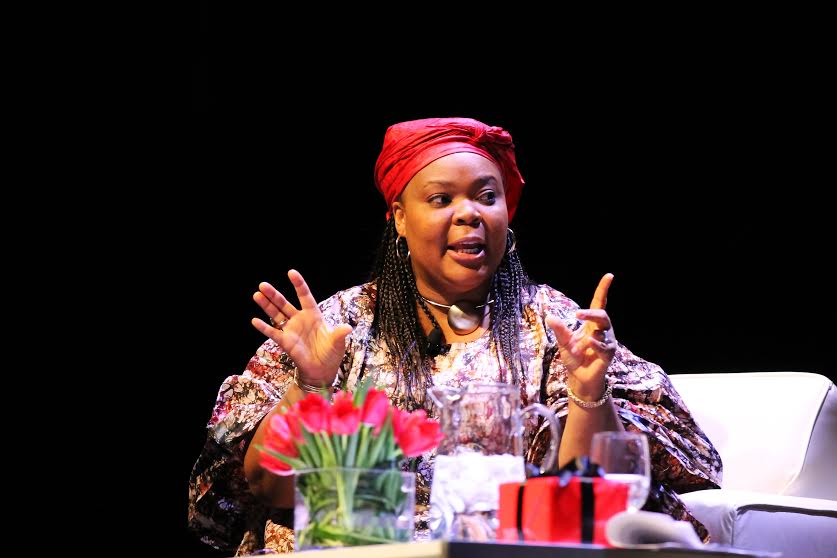By Caroline Boschetto, news correspondent
Nobel Peace Prize Laureate Leymah Gbowee kicked off the inaugural New England Interfaith Student Summit on Thursday, drawing from her experiences of unifying Christian and Muslim women to urge Northeastern students to crush racial and religious barriers.
“It will never happen until you have those painful conversations to tear down the wall of ‘us’ versus ‘them’,” Gbowee said. “Until you do that, people will walk this campus for four years and they will see objects, not humans.”
The forum, held in Blackman Auditorium, began with a clip from the 2008 documentary “Pray the Devil Back to Hell,” which chronicled the story of Gbowee’s peace movement. Dr. Uta Poiger, the dean of Northeastern’s College of Social Sciences and Humanities, then introduced Gbowee.
A women’s rights advocate and political icon, Gbowee organized and led The Women of Liberia Mass Action for Peace, which helped to end the Liberian civil war in 2003 and led to the election of Africa’s first female head of state.
Poiger cited Gbowee’s accolades, some of which include co-founding the Women Peace and Security Network Africa, creating the nonprofit Gbowee Peace Foundation Africa, earning honorary degrees from universities on three continents and winning the Nobel Peace Prize in 2011.
“[Gbowee] has been part of the vanguard of women taking control of their political destiny around the world,” Poiger said.
The woman of the night, wearing a floral dress, gold hoop earring and a pink scarf, proceeded onto the stage.
“We live in a time of extreme fear,” Gbowee said. “Is this the world that we want to leave the next generation, a world where the way you are dressed determines the way you are treated?”
Gbowee detailed her experience living in Liberia as it shifted from a place of peace and interfaith harmony to a war-torn, divided state. She said she felt let down by her Christian faith and community, and she harbored anger for a long time. Gbowee said she was then inspired by a dream to bring Christians and Muslims together to create peace.
“We had a simple message: Liberian women, awake for peace,” Gbowee said. “We did not say Christian women, Muslim women or indigenous women. We said Liberian women.”
She spoke about how “resocialization” among the women was necessary to break down prejudices and build unity before real activism could begin.
“If someone started shooting in this room, would the bullet be able to pick the Christian from the Muslim?” she asked, recalling a question she posed to the Liberian women. “When a Christian woman lost a child, or a Muslim woman, is the cry different? Is the pain different?”
Gbowee also spoke of the necessity of cultural and religious tolerance worldwide. She told a personal story of an American security officer treating her rudely after she returned from Liberia amid the Ebola crisis. The officer’s tone changed only after another man made her celebrity status known.
“Are you kidding me?” Gbowee said. “Before, I was a big ball of Ebola. Now I am a person?”
She turned the conversation toward Northeastern, calling the university community to create unity through dialogue.
“Don’t keep it to the textbook [and] try to be more practical” Gbowee told one student. “Leave of the comfort of school…so that when you have your fancy degree you don’t destroy the peace process by thinking the men that bring war are the same ones that can bring peace.”
Toward the end of the speech, Gbowee’s 13-year-old goddaughter Emma Broffee went up on stage and sat on Gbowee’s lap.
“She is sweet and humble,” Broffee said about her godmother after the talk.
Edineide Rosa, a Northeastern graduate student studying project management, said she was impressed with the interfaith component of Gbowee’s speech.
“That kind of speaks volumes about how people from different religions can come together and make something positive,” Rosa said.
Chelsea Tibbitt, a Northeastern senior nursing major, said she was inspired by Gbowee’s mission.
“I think that we need to do a better job with that same mission, especially empowering women of color in this country and showing them that they have a voice and that they can make a change,” Tibbitt said.
According to Gbowee, some individuals have been less receptive to her mission. She described an encounter with an American politician who called her “a troublemaker” in a derogatory manner.
“You’ve forgotten one thing,” Gbowee said she told her. “I won the Nobel Peace Prize for making trouble.”
Photo by Leila Habib















